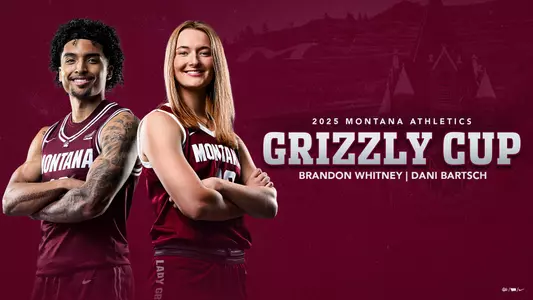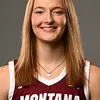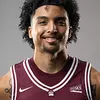
Whitney, Bartsch named Grizzly Cup winners
4/30/2025 9:50:00 AM | Men's Basketball, Women's Basketball
Imagine getting the chance to escort Lawrence Higbee around campus, particularly the athletics corner of that world, more than a century after he was named the first winner of the Grizzly Cup back in 1921.
Imagine taking him down the tunnel and onto the field of the football cathedral that is Washington-Grizzly Stadium.
In Higbee's final season playing that sport, the fall of 1920, the University of Montana had just dedicated a new patch of land on which football could be played, a few steps north of the Men's Gym.
Butte's Harry Dahlberg, that team's captain, spent his summer devotedly tending to that plot of land until grass grew that was suitable for that fall's four home games.
Imagine walking him through the Washington-Grizzly Champions Center and explaining to him the role of strength and conditioning compared to what he relied upon as a three-sport Grizzly athlete.
And imagine listening to him tell you of how he lost two of his college years because of World War I, when so many young men his age served and hopefully returned to life as they had known it.
That patch of land, the new football home? It would be named Dornblaser Field in memory of Paul Dornblaser, former Grizzly tackle, one of the boys who did not return home from battlefields afar.
Or imagine showing him the Grizzly Indoor Practice Facility, a climate-controlled space that could comfortably hold the entirety of UM's student population from Higbee's final year on campus: 811.
Higbee played football in the fall, when that sport had 30 young men come out and a competitive season that ran from early October to mid-November.
After the holidays, the Missoula native turned to basketball and a schedule that started in January and had road trips that maxed out to Walla Walla.
Higbee's best sport was baseball. In the spring of 1920, he helped Montana go 14-2, the Grizzlies winning the Northwest Conference, the school's first league championship.
In the spring of 1921, Montana went a perfect 15-0, Higbee's swan song a 6-4 win at Montana State, Higbee batting a sweet .446 for the season.
Then: Imagine sitting him down at a computer and letting him do a deep dive into the current state of college athletics. NIL, the transfer portal, revenue sharing, athletes able to jump from school to school.
Would he be impressed? Would he like what it has become? Would he even recognize it?
Then imagine walking him into a cozy space where this year's Grizzly Cup winners – Brandon Whitney and Dani Bartsch – are waiting for him, the three swapping stories back and forth, of then and now.
After overcoming his initial shock – wait, women play sports now? – he would have discovered he had just been introduced to a pair kindred spirits, who owned traits that span decades, centuries even.
When Higbee was a Grizzly, he would have competed for love of school, of teammates, of competition, of the sport that was in season. There were no financial gains to be made, only time devoted.
At his graduation, at 10:30 a.m. on June 11, Higbee and the other 165 graduates, right after the grand procession, sang "Montana, My Montana."
Our chosen state, all hail to thee, Montana, my Montana! Find her full many a victory won, Montana, my Montana!
Whitney and Bartsch are this year's winners of the Grizzly Cup, partly for their loyalty, their longevity, their love of school, of teammates, of the chance to play basketball at Montana.
They are winners of the Grizzly Cup because they mastered the skills that made their teammates and ultimately their teams better, something Higbee, even a century later, could have appreciated.
Whitney and Bartsch excelled in the timeless traits, the ones that require a bit of sacrifice, of putting others over self for the betterment of all, something that worked as well in 1921 as it does in 2025.
Whitney? He ended his career with a Montana-record 443 assists, the final person so many times to touch the ball before someone else scored, before someone else could make the highlights.
Bartsch? She ended her career with 897 rebounds, second-most in program history, the only reason she isn't atop the list because she gave so much of herself to the Lady Griz that her body finally broke down.
Higbee knew of disruption, of World War I shutting down college athletics at so many schools, with a lack of young men on campus, later the 1918 flu pandemic causing its own havoc.
On a less intense scale, Whitney and Bartsch had to navigate their way through COVID-19, Whitney graduating the spring of its arrival in the U.S. in 2020, a few months later coming to an empty campus.
Bartsch graduated a year later, her high school career more impacted than her Lady Griz journey.
Whitney later turned it into an opportunity to be seized, a fifth year of competition, a first in college athletics, ultimately playing in 157 career games, starting 151 of them, the most in Big Sky history.
His reward? A shared Big Sky regular-season championship, then an outright title in Boise in March, earning tournament MVP honors that he took with him to his first NCAA tournament.
His career numbers speak of a player who only added to what the team needed of him, rarely taking anything away.
He shot better than 50 percent for his career, totaled 1,621 points, the ninth-most in program history, and had a 2.08 assist-to-turnover ratio, his entire game firmly on the good side of plus-minus.
Whitney spent his Griz career playing for a single coach, Travis DeCuire. Bartsch signed to join the Lady Griz under one coach, played three-plus seasons for another, her final two months for third.
Like Whitney, she made a name for herself by always being there, oftentimes in the background of flashier teammates, just Dani being Dani, doing the right thing if people were watching or not.
All those jumps and landings from years playing volleyball, all that disregard of her own well-being if it meant sacrificing a bit of herself for the team, it all caught up to her, a slow-rolling breakdown.
The shoulder that required offseason surgery. The foot that required offseason surgery. But she owed it to her teammates, to her coaches, to the team, to the school to go full warrior mode and tough it out.
Could there have been a more perfect script in the works, like Higbee's walk-off win over Montana State, than Bartsch's near moment in Boise, the 3-pointer that would have gone down in Lady Griz lore?
Whitney got his championship. Bartsch came up one second short. But neither needed those final games to become this year's recipients of the Grizzly Cup.
Rather, their victories, their Grizzly Cups, were career recognitions, of being true to school, of being selfless teammates, qualities that worked in 1921, work in 2025 and every year in between.
Imagine taking him down the tunnel and onto the field of the football cathedral that is Washington-Grizzly Stadium.
In Higbee's final season playing that sport, the fall of 1920, the University of Montana had just dedicated a new patch of land on which football could be played, a few steps north of the Men's Gym.
Butte's Harry Dahlberg, that team's captain, spent his summer devotedly tending to that plot of land until grass grew that was suitable for that fall's four home games.
Imagine walking him through the Washington-Grizzly Champions Center and explaining to him the role of strength and conditioning compared to what he relied upon as a three-sport Grizzly athlete.
And imagine listening to him tell you of how he lost two of his college years because of World War I, when so many young men his age served and hopefully returned to life as they had known it.
That patch of land, the new football home? It would be named Dornblaser Field in memory of Paul Dornblaser, former Grizzly tackle, one of the boys who did not return home from battlefields afar.
Or imagine showing him the Grizzly Indoor Practice Facility, a climate-controlled space that could comfortably hold the entirety of UM's student population from Higbee's final year on campus: 811.
Higbee played football in the fall, when that sport had 30 young men come out and a competitive season that ran from early October to mid-November.
After the holidays, the Missoula native turned to basketball and a schedule that started in January and had road trips that maxed out to Walla Walla.
Higbee's best sport was baseball. In the spring of 1920, he helped Montana go 14-2, the Grizzlies winning the Northwest Conference, the school's first league championship.
In the spring of 1921, Montana went a perfect 15-0, Higbee's swan song a 6-4 win at Montana State, Higbee batting a sweet .446 for the season.
Then: Imagine sitting him down at a computer and letting him do a deep dive into the current state of college athletics. NIL, the transfer portal, revenue sharing, athletes able to jump from school to school.
Would he be impressed? Would he like what it has become? Would he even recognize it?
Then imagine walking him into a cozy space where this year's Grizzly Cup winners – Brandon Whitney and Dani Bartsch – are waiting for him, the three swapping stories back and forth, of then and now.
After overcoming his initial shock – wait, women play sports now? – he would have discovered he had just been introduced to a pair kindred spirits, who owned traits that span decades, centuries even.
When Higbee was a Grizzly, he would have competed for love of school, of teammates, of competition, of the sport that was in season. There were no financial gains to be made, only time devoted.
At his graduation, at 10:30 a.m. on June 11, Higbee and the other 165 graduates, right after the grand procession, sang "Montana, My Montana."
Our chosen state, all hail to thee, Montana, my Montana! Find her full many a victory won, Montana, my Montana!
Whitney and Bartsch are this year's winners of the Grizzly Cup, partly for their loyalty, their longevity, their love of school, of teammates, of the chance to play basketball at Montana.
They are winners of the Grizzly Cup because they mastered the skills that made their teammates and ultimately their teams better, something Higbee, even a century later, could have appreciated.
Whitney and Bartsch excelled in the timeless traits, the ones that require a bit of sacrifice, of putting others over self for the betterment of all, something that worked as well in 1921 as it does in 2025.
Whitney? He ended his career with a Montana-record 443 assists, the final person so many times to touch the ball before someone else scored, before someone else could make the highlights.
Bartsch? She ended her career with 897 rebounds, second-most in program history, the only reason she isn't atop the list because she gave so much of herself to the Lady Griz that her body finally broke down.
Higbee knew of disruption, of World War I shutting down college athletics at so many schools, with a lack of young men on campus, later the 1918 flu pandemic causing its own havoc.
On a less intense scale, Whitney and Bartsch had to navigate their way through COVID-19, Whitney graduating the spring of its arrival in the U.S. in 2020, a few months later coming to an empty campus.
Bartsch graduated a year later, her high school career more impacted than her Lady Griz journey.
Whitney later turned it into an opportunity to be seized, a fifth year of competition, a first in college athletics, ultimately playing in 157 career games, starting 151 of them, the most in Big Sky history.
His reward? A shared Big Sky regular-season championship, then an outright title in Boise in March, earning tournament MVP honors that he took with him to his first NCAA tournament.
His career numbers speak of a player who only added to what the team needed of him, rarely taking anything away.
He shot better than 50 percent for his career, totaled 1,621 points, the ninth-most in program history, and had a 2.08 assist-to-turnover ratio, his entire game firmly on the good side of plus-minus.
Whitney spent his Griz career playing for a single coach, Travis DeCuire. Bartsch signed to join the Lady Griz under one coach, played three-plus seasons for another, her final two months for third.
Like Whitney, she made a name for herself by always being there, oftentimes in the background of flashier teammates, just Dani being Dani, doing the right thing if people were watching or not.
All those jumps and landings from years playing volleyball, all that disregard of her own well-being if it meant sacrificing a bit of herself for the team, it all caught up to her, a slow-rolling breakdown.
The shoulder that required offseason surgery. The foot that required offseason surgery. But she owed it to her teammates, to her coaches, to the team, to the school to go full warrior mode and tough it out.
Could there have been a more perfect script in the works, like Higbee's walk-off win over Montana State, than Bartsch's near moment in Boise, the 3-pointer that would have gone down in Lady Griz lore?
Whitney got his championship. Bartsch came up one second short. But neither needed those final games to become this year's recipients of the Grizzly Cup.
Rather, their victories, their Grizzly Cups, were career recognitions, of being true to school, of being selfless teammates, qualities that worked in 1921, work in 2025 and every year in between.
Players Mentioned
Griz Football Weekly Press Conference 11/3/25
Monday, November 03
Montana vs Weber St. Highlights
Sunday, November 02
Griz Football Weekly Press Conference - 10/13/25
Tuesday, October 28
Griz Volleyball vs. Weber State Postgame Report - 10/25/25
Tuesday, October 28









